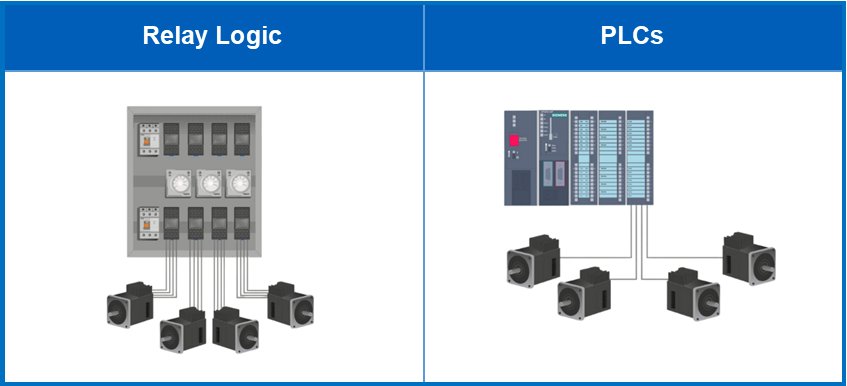Relays vs PLCs
Only the simplest powered electrical systems and equipment require just an on-off switch.
In reality, most processes need a control system to manage commands and/or direct or regulate the behaviour of other devices or systems.
Originally, these control systems would have been designed using Relay Logic which is a large array of hard-wired controls utilising sensors, switches, timers, relays & contactors. Relay Logic has many applications, including Compressor Control systems, Lighting Controls, Machine Safety Circuits and much more.
With the development of microprocessors in the 1960s, Programmable Logic Controllers (PLCs) were created. PLCs use programming language, referred to as ladder logic, to create the relay logic and as such offer many advantages over traditional relays.

The main advantages of PLCs over relays are:
- Reliability. PLC Systems with their solid-state components tend to last longer than the moving parts of electromechanical relays
- Troubleshooting. PLCs are generally easier to identify problems as there are less wires in a PLC. In a physical relay each device needs a minimum of four wires to operate whereas a relay output sends out one wire to the output device.
- Easy expandability. If you want to add functionality to a PLC you can just add it to the programme and set up the constraints, where a relay system needs the new physical component added and the necessary wiring to make it work.
- Smaller size. The space required for a PLC system vs the cabinet needed for a relay logic circuitry is much smaller.
While PLCs offer many advantages, relays do still have a place within a control system. They provide a simple and efficient tool that requires no advanced programming for proper commissioning. Relays can be particularly useful:
- where there are only a few IO points per control system.
- where the application require little troubleshooting of wired logic.
- to reduce alarms & response tasks from Safety PLCs.
- where there are interposing voltage relays.
If you would like advice on the best control system for your application, get in touch with the EAS team today on 07 834 0505 so we can work together to find the best solution for you.

Leave a Reply
Want to join the discussion?Feel free to contribute!